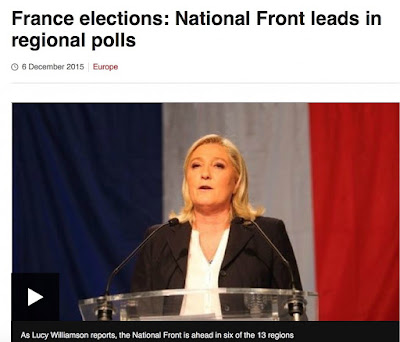By Michael Krieger: Martin Schulz is the head of the European Parliament, and he’s very worried about the future of the EU. Indeed, he’s so concerned he told a German magazine that the project was at risk of falling apart. But don’t take my word for it.
From Reuters:
The European Union is at risk of falling apart and supporters must fight to keep it, the head of the European Parliament said in a German newspaper interview.
Meanwhile, on a somewhat related note, I came across a very disturbing article about how Facebook is blocking a BBC article about the success of the National Front Party in France, by deeming it “unsafe.” Of course, nobody has a clue what this means, which is apparently how Facebook likes it.
From TechDirt:
It merely contains commentary on how well the anti-euro National Front Party is doing. For example:
In Liberty,
Michael Krieger
Source
From Reuters:
The European Union is at risk of falling apart and supporters must fight to keep it, the head of the European Parliament said in a German newspaper interview.
Martin Schulz told Die Welt’s Tuesday edition that the EU was in danger and that there were forces trying to pull it apart.Of course, he’s absolutely right. As I wrote recently in the post, A Message to Europe – Prepare for Nationalism:
He was responding to a recent warning from Jean Asselborn, Luxembourg’s foreign affairs and migration minister, that the EU might break apart,
“No one can say whether the EU will still exist in this form in 10 years’ time. If we want that then we need to fight very hard for it,” Schulz said.
He was not specific about what was threatening the EU, but much of the interview was focused on the migrant crisis, which has stretched Europe’s unity and tolerance during the year.
Schulz said that the EU was not without alternatives and “could of course be reversed”, adding that other options including a Europe in which nationalism, borders and walls were prevalent.
Actions have consequences, and people can only be pushed so far before they snap. I believe the Paris terror attacks will be a major catalyst that will ultimately usher in nationalist type governments in many parts of Europe, culminating in an end of the EU as we know it and a return to true nation-states. Although I think a return to regional government and democracy is what Europeans need and deserve, the way in which it will come about, and the types of governments we could see emerge, are unlikely to be particularly enlightened or democratic after the dust has settled.The EU is toast. There’s no doubt in my mind about it. The only question is what will come next, and how ugly will the political backlash get.
Meanwhile, on a somewhat related note, I came across a very disturbing article about how Facebook is blocking a BBC article about the success of the National Front Party in France, by deeming it “unsafe.” Of course, nobody has a clue what this means, which is apparently how Facebook likes it.
From TechDirt:
Lots of people have reasonable concerns about platforms like Facebook which not only provide an avenue for free expression — but which also have the power to suddenly decide it won’t allow certain forms of expression. Admittedly, there’s always a line to be drawn somewhere. People are happy that Facebook tries to keep out spam and scams, but it’s still worrying when it seems to want to filter out perfectly legitimate news stories. On Sunday, Nadim Kobeissi tweeted that Facebook wouldn’t allow the sharing of a BBC article on the latest political polling in France.What’s so crazy about all of this is how benign the actual article is if you read it. Here’s what the header looks like:
I wasn’t sure I believed it so I tried to post that link to my own Facebook page and got a similar message:
Now it’s possible that there’s a concern over rogue dangerous ads on the BBC site — though for many people the BBC displays no ads at all. It’s also possible that Facebook’s algorithms interpret news about the National Front party (which is politely described as “far right,” but might more accurately be described as nationalist-to-racist) as somehow dangerous. But, just the fact that Facebook is magically determining that a news story is somehow “unsafe” without giving me any details to understand why or how is tremendously concerning.
And, again, this comes just after we’ve seen American politicians calling for Facebook and others to magically determine how to block “bad” content that might inspire terrorists. And, it comes just as Google’s Eric Schmidt argued that these kinds of filters should be more common. Yet, examples like this show just how problematic the idea of these kinds of filters can be.
It merely contains commentary on how well the anti-euro National Front Party is doing. For example:
The message from the first round of France’s regional elections is simple and unequivocal – once again the far right has come out on top.
For the third time in a year and a half, Marine Le Pen can legitimately say that her National Front is the country’s most popular party.
It is an astonishing performance for a party that until very recently was regarded as beyond the pale.
The Paris attacks will have played a part in this but it would be wrong to ascribe Ms Le Pen’s triumph solely to fears of terrorism.
Her party has been on a steady upward slope for four years. The problems that worry voters are as much economic and social as they are security-related.Is Facebook trying to intentionally keep its users in the dark as it relates to the changing dynamics of European politics, or was this just a harmless error? Either way, the company owes its users an explanation.
In Liberty,
Michael Krieger
Source


No comments:
Post a Comment